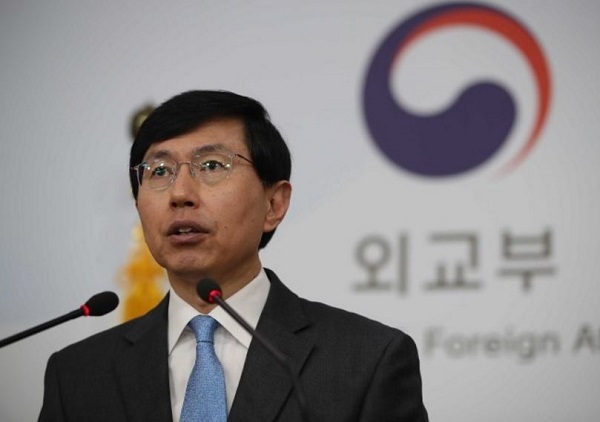Seoul on Tuesday protested Tokyo’s intensified claim to the Korean islets of Dokdo in an annual diplomatic paper, which added to territorial and historical tension between the two countries.
Japan’s Foreign Ministry reported to the cabinet its latest diplomatic bluebook, which argues Dokdo is the country’s “inherent territory” based on historical facts and international law, and calls last year’s visits to the islets by some Korean lawmakers “adamantly unacceptable.”
Seoul’s Foreign Ministry instantly lodged a complaint, summoning Hideo Suzuki, a minister of the Japanese Embassy here.
Japan’s Foreign Ministry reported to the cabinet its latest diplomatic bluebook, which argues Dokdo is the country’s “inherent territory” based on historical facts and international law, and calls last year’s visits to the islets by some Korean lawmakers “adamantly unacceptable.”
Seoul’s Foreign Ministry instantly lodged a complaint, summoning Hideo Suzuki, a minister of the Japanese Embassy here.

“We strongly protest the Japanese government’s reiteration through the diplomatic bluebook of its unjust sovereignty claim to Dokdo, which is clearly our own territory historically, geographically and under international law, and urge its immediate withdrawal,” the ministry said in a statement.
“The Japanese government must cease its futile attempts regarding Dokdo at once, and realize that the correct historical awareness is a starting point and prerequisite for the two countries’ relationship.”
The paper would serve to further dampen bilateral ties already strained by Tokyo’s reinforcement of its Dokdo claims in educational guidelines and school textbooks, as well as its recall home of its ambassador over a new “comfort women” statue. Yasumasa Nagamine returned to Seoul earlier this month, 85 days after he was recalled, marking the longest absence of the Japanese representative here.
The bluebook says the establishment last December of the statue near the Japanese consulate-general in Busan goes against a 2015 settlement on the wartime sex slavery dispute, calling it “deeply regrettable.”
“It is an obligation for the international community to implement the agreement with responsibility,” it reads.
The clause reflects Tokyo’s efforts to highlight the deal’s “final and irreversible” nature amid growing concerns over a possible reneging of the deal by the next Korean administration. Across the political spectrum, almost all of the leading presidential candidates including front-runner Moon Jae-in have pledged to upend or renegotiate it, taking issue with what they perceive as the failure to provide a sincere apology and legal compensation for the women.
“In terms of the relationship with Japan, we’ve been dealing separately with historical issues and issues of mutual benefit such as security and the economy,” Foreign Ministry spokesperson Cho June-hyuck said at a news briefing.
“I’m not entitled to speak on the next government’s policy, but have repeatedly made clear the government’s position on the settlement.”
On bilateral relations, the report retained the existing portrayal of Korea as the “most important neighbor that shares strategic interests,” noting the compromise on the sex slavery issue ushered in a “new era of a future-oriented relationship.”
Until the 2015 edition, the text had said the two nations share “fundamental values such as freedom, democracy and respect for human rights, and common interests in maintaining regional peace and security.”
Introduced in 1957, the yearly paper has in recent years been stepping up its territorial and historical arguments in line with the Shinzo Abe government’s campaign. It also addresses sovereignty brawls with China over the Senkaku or Diayou islands in the East China Sea, and with Russia over the Southern Kurils or the Northern Territories in Japan.
By Shin Hyon-hee (heeshin@heraldcorp.com)
















![[KH Explains] Hyundai's full hybrid edge to pay off amid slow transition to pure EVs](http://res.heraldm.com/phpwas/restmb_idxmake.php?idx=652&simg=/content/image/2024/04/18/20240418050645_0.jpg&u=20240418181020)

![[Today’s K-pop] Zico drops snippet of collaboration with Jennie](http://res.heraldm.com/phpwas/restmb_idxmake.php?idx=642&simg=/content/image/2024/04/18/20240418050702_0.jpg&u=)